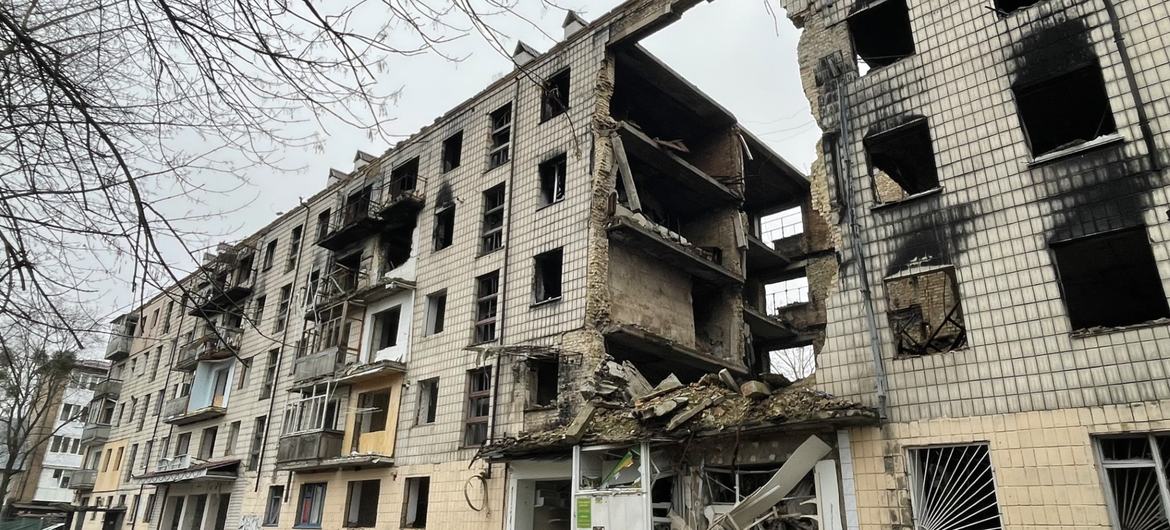
Ukraine war: Alarm raised in Security Council over civilian attacks
© UNRWA A queue for food in Gaza where the UN and partners are working to stave off rising levels of hunger and life-threatening malnutrition as the war enters its sixth month.
United Nations, 8 March 2024
A recent sharp rise in deadly attacks against civilians in Ukraine and Russia, including by armed drones, run counter to international law and must end now, top UN officials told the Security Council on Friday afternoon.

“We condemn all attacks on civilians and civilian infrastructure,” said Khaled Khiari, Assistant Secretary-General at the UN Departments of Political and Peacebuilding Affairs and Peace Operations. “They are prohibited under international law; they are unacceptable and must stop now.”
“Regrettably, our repeated calls for protection of civilians appear to fall on deaf ears,” he said, pointing to the Ukrainian port city of Odesa which has become a frequent target of lethal missile and drone attacks in recent days and weeks.
Spike in drone attacks
As the full-scale Russian invasion enters its third year, recent civilian casualties have also been reported in Kharkiv, Donetsk, Sumy and Zaporizhzhia regions of Ukraine, Mr. Khiari said.
In addition, reports show “the fighting is spreading to new residential areas in the east of Ukraine”, he said, noting the complete, or near complete, destruction of villages, towns and cities at the hands of Russian forces since the war began, including in Mariupol, Bakhmut, Lysychansk, Severodonetsk, Volnovakha and most recently in Avdiivka.
“This horrific pattern must not be perpetuated,” he said, emphasizing that more than 10,000 civilians have been killed since the start of the conflict, according to the Office of the High Commissioner for Human Rights (OHCHR).

Invasion, illegal elections, annexations must end
Turning to other serious concerns, he said reports of Russia’s plans to hold its March presidential elections in the territories of Ukraine currently under its control are “deeply disturbing”.
“The attempted illegal annexations of Ukrainian territory have no validity under international law, as also declared by the UN General Assembly,” he said.
“The past two years of war have come with a heavy price for Ukraine, Europe and the world,” he said. “We must not allow for this war to bring further loss of life, destruction and suffering.”
‘Time to bring suffering to an end’
Echoing that call, was Lisa Doughten, of the Office for the Coordination of Humanitarian Affairs (OCHA), who briefed the Council about the grim situation on the ground.

The latest wave of escalatory attacks amid a harsh winter shows how the conflict continues to inflict immeasurable human suffering, death and devastation on the people of Ukraine, she said, delivering a statement on behalf of UN emergency relief chief Martin Griffiths.
“Attacks directed against civilians and civilian objects are prohibited under international humanitarian law,” she stressed.
“Indiscriminate attacks are also strictly prohibited; parties to the conflict must take constant care to spare all civilians and civilian objects, including infrastructure essential for civilians’ survival.”
Harsh impact, especially on women and girls
She also said the conflict is also having a particularly harsh impact on women and girls in Ukraine, she said, honouring them on this International Women’s Day, with an increase in gender-based violence against them being “a shocking hallmark of this war”.
One third of women-led households in Ukraine are struggling to feed themselves, and 60 per cent of older women are unable to provide for their own basic needs, according to the UN reproductive health agency, UNFPA, she regretted to note.
“Tragically, a lack of sufficient resources to sustain and expand a network of medical and social care services means many of the 2.5 million people anticipated to be subjected to gender-based violence in the coming year” will not have access to services they need, she said.

UN will help ‘for as long as it takes’
“The UN and its partners continue to do everything we can to provide humanitarian assistance to millions of people across Ukraine in spite of the ongoing and deteriorating security situation,” she said, noting that two humanitarian workers have lost their lives and 10 have been injured in 2024 alone, highlighting the dangers of delivering aid close to the frontline.
“As hostilities continue to escalate, we are deeply concerned about the fate of civilians in these territories whom we are unable to reach at any adequate scale,” she said, including the lack of humanitarian access to the Russian-occupied parts of Donetsk, Kherson and Luhansk.
“The consequences for an estimated 1.5 million people in need of lifesaving assistance there are unthinkable, and they are avoidable,” she said, adding that international humanitarian law requires all parties to allow and facilitate the rapid and unimpeded passage of humanitarian relief for civilians in need and must ensure that aid workers have the freedom of movement required for their work.
The UN and its aid partners remain committed to safeguarding the life and dignity of civilians “for as long as it takes, but it has gone on too long,” she said, adding that “it is time to bring the humanitarian catastrophe in Ukraine and the suffering of the Ukrainian people to an end.”
The original article appeared here.